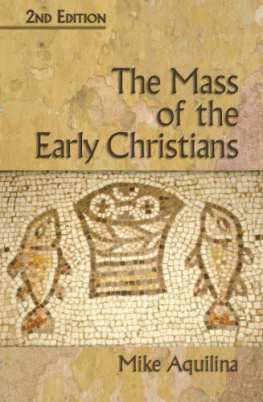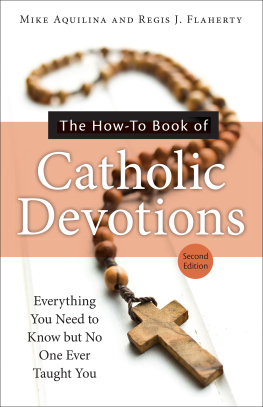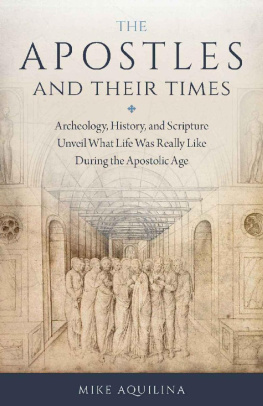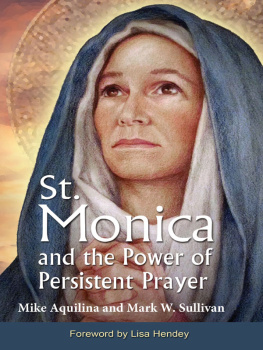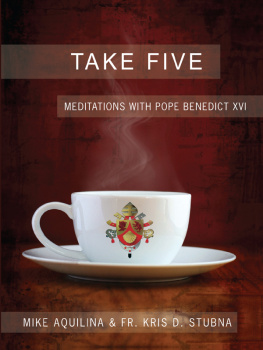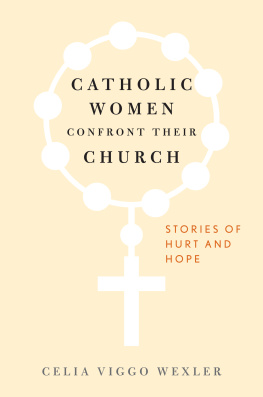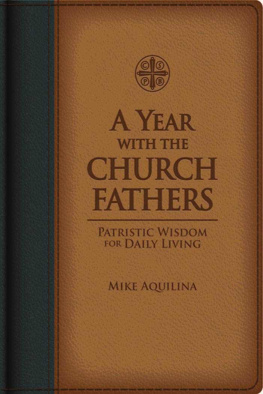Mothers
of the Church
Mothers
of the Church

The Witness of Early Christian Women
Mike Aquilina and Christopher Bailey
Our Sunday Visitor Publishing Division
Our Sunday Visitor, Inc.
Huntington, Indiana 46750
The Scripture citations used in this work are taken from the Second Catholic Edition of the Revised Standard Version of the Bible (RSV), copyright 1965, 1966, and 2006 by the Division of Christian Education of the National Council of the Churches of Christ in the United States of America. Used by permission.
All rights reserved.
Every reasonable effort has been made to determine copyright holders of excerpted materials and to secure permissions as needed. If any copyrighted materials have been inadvertently used in this work without proper credit being given in one form or another, please notify Our Sunday Visitor in writing so that future printings of this work may be corrected accordingly.
Copyright 2012 by Mike Aquilina and Christopher Bailey. Published 2012.
17 16 15 14 13 12 1 2 3 4 5 6 7 8 9
All rights reserved. With the exception of short excerpts for critical reviews, no part of this work may be reproduced or transmitted in any form or by any means whatsoever without permission in writing from the publisher. Contact: Our Sunday Visitor Publishing Division, Our Sunday Visitor, Inc., 200 Noll Plaza, Huntington, IN 46750; 1-800-348-2440; .
ISBN: 978-1-61278-562-2 (Inventory No. T1260)
eISBN: 978-1-61278-210-2
LCCN: 2011944060
Cover design: Amanda Falk
Cover image: Basilica of SantApollinare Nuovo in Ravenna, Italy: Procession of the Holy Virgins and Martyrs
Interior design: M. Urgo
PRINTED IN THE UNITED STATES OF AMERICA
For Teresa and Terri

Table of Contents

Acknowledgments
In spite of the names on the cover, the real originator of this book and its title is Teresa Bailey. It was she who said to her husband: Why havent you and Mike written a book about the Mothers of the Church? I mean, everyone knows about the Fathers of the Church, but what about the Mothers?
Its other progenitor, of course, is Terri Aquilina. These are two women who have spent their lives modeling the strength of character and intellect that made the women in these pages so memorable. They are mothers, writers, thinkers, leaders, and since they have to live with us martyrs.
In producing the book itself, we had the enormous advantage of living in the digital age. Primary sources that would have taken us years to track down before the Internet came along are now easily searchable on line. But theyre available only because of the heroic volunteers who digitized these sources in the first place. Among those volunteers, we must especially express our gratitude to Roger Pearse (Tertullian.org), whose work has made many of the rarest texts of early Christianity accessible to everyone, and to Kevin Knight (NewAdvent.org), who keeps a digital library of the standard editions of the Church Fathers so that everyone can apply all the power of a modern search engine to them. Many other online collectors have helped us with obscure sources, and were grateful to all of them.
As the work on this book came to a close, Teresa told us: I cant believe I had to think of that for you. But it doesnt seem unbelievable to the authors at all.
Abbreviations
Weve tried to keep confusing abbreviations to a minimum, but the standard editions of the early Christian writers in English are two series with unwieldy titles. Weve abbreviated them this way:
ANF: The Ante-Nicene Fathers: Translations of the Writings of the Fathers Down to A.D. 325. Edited by the Rev. Alexander Roberts, D.D., and James Donaldson, LL.D. (New York: Charles Scribners Sons, 1903).
NPNF1: A Select Library of the Nicene and Post-Nicene Fathers of the Christian Church. Edited by Philip Schaff, D.D., LL.D. (New York: The Christian Literature Company, 1887).
NPNF2: A Select Library of the Nicene and Post-Nicene Fathers of the Christian Church, Second Series. Edited by Philip Schaff, D.D., LL.D., and Henry Wace, D.D. (New York: The Christian Literature Company, 1890).
The abbreviations are followed by the volume and page number so that, for example, NPNF2 10:364 means that the passage is found in the Nicene and Post-Nicene Fathers, Second Series, volume 10, page 364.
Many of the quotations from the Mothers and Fathers of the Church are taken from the versions of these texts hosted at New Advent (NewAdvent.org) and the Tertullian Project (Tertullian.org), with the kind permission of the compilers of those sites, Kevin Knight and Roger Pearse, respectively. We have updated the language of some of the older translations, to make them intelligible to modern readers.
Chapter 1
The Christian Revolution

There is neither Jew nor Greek, there is neither slave nor free, there is neither male nor female; for you are all one in Christ Jesus (Galatians 3:28).
When St. Paul wrote those famous words, he was lobbing a verbal grenade at the established order of things. And he knew it.
It was possible for a Greek in the Roman Empire to imagine that Jews were human too. Although they had different customs, they did have a long intellectual tradition, and the more moderate ones could adapt to Greek customs so well that they hardly looked any different from regular people.
And it was just barely possible to imagine that there was no real distinction in nature between slave and free. After all, slaves might have been princes captured in battle. Only fortune, that notoriously fickle principle, had brought them low, and fortune might do the same to any person one day.
But any reasonable man would draw the line at neither male nor female. The difference between male and female was the order of nature. Males were superior (a man would say) because women were inferior. It was obvious so obvious that it hardly needed an argument. Fire is hot, water is wet, and women are inferior to men. This unquestioned and unquestionable truth was the basis of all human society. If Christianity merely denied the old pagan gods, that could have been forgiven hardly anyone in the better classes really believed in them anyway. But Christianity was a frontal assault on Roman family values, and that made it a danger to the state.
To understand just how dangerous Christianity was, though, we need to have some understanding of Roman family values, and what they meant if you happened to be female.
What Good Was a Girl?
It wasnt easy growing up a girl in the pagan Roman Empire. In fact, there was a good chance a girl wouldnt grow up at all.
Children had no rights: they belonged to their father, and in theory he had the power of life and death over them. Of course, a boy was valuable, which tended to mitigate the arbitrariness of his father. It would be worth all the trouble and expense to raise a boy to adulthood because he would carry on the family, and he would be there to take care of his parents in their old age.
But what good was a girl? If the parents were lucky, their daughter might marry into a powerful family and make a useful alliance for them. More likely, though, they would have to feed and care for her for fifteen years or so, and then they would have to pay some useless wastrel a ruinous dowry for taking her off their hands. No wonder one of the favorite adjectives for daughters was odious.
Next page

